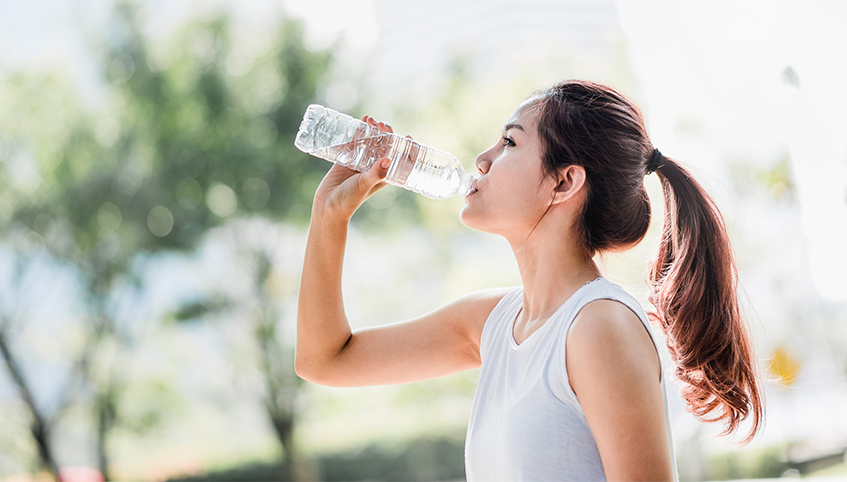
Staying well-hydrated is important for athletes, especially when outdoor temperatures rise. It’s crucial to drink enough liquids all day long as well as when you’re exercising or playing a sport.
Drinking enough water is important for our bodies. It helps our body control our temperature, keeps our joints working smoothly and moves nutrients around. As you exercise longer and harder, it becomes even more important to drink the proper kind and amount of fluid.
If you aren't adequately hydrated while competing in your sport, it can lead to decreased performance. You might have trouble focusing, get tired more quickly and experience physical symptoms like cramps or dizziness. However, you don’t have to experience these more severe side effects to be underhydrated. Here are 2 easy ways to make sure you’re drinking enough fluid.
- Check your urine. Note the amount and its color. It should be a light yellow, like lemonade, and not clear.
- Monitor your weight loss. If appropriate, you can weigh yourself before and after you play. Weight loss during activity will generally only be from sweating. If you lose more than 2% of your body weight, you might not be drinking enough fluid. That can lead to dehydration and negatively affect how you play.
How much fluid should you drink?
How much fluid you should drink is determined by many factors, for example, how long you play, how hard you play and the weather. It may also vary based on your body size, sport, how much you sweat and where you train.
Before exercise
- You may need to include fluids that contain sodium before starting exercise.
- 4 hours before you start exercising, drink 5-7 milliliters per kilogram of body weight. For example, if you weigh 150 pounds, that’s equivalent to about 68 kilograms. You would want to drink 340-476 milliliters, or about 12-16 ounces.
- 2 hours before you start exercising, if you can’t pee or your pee is dark, drink 3-5 milliliters per kilogram of body weight. In our example, this would be around 7-12 ounces of fluid containing sodium.
During exercise
- How much fluid you need depends on how much you sweat. Try to drink about 4-6 ounces of fluid every 15 minutes for a total of 16-24 ounces per hour.
- If you’re going to exercise for more than an hour, it’s a good idea to drink a sports drink containing carbohydrates instead of just water.
After exercise
- If appropriate, you can weigh yourself before and after your workout, and drink 20-24 ounces of fluid for every 1 pound lost.
- Another way to make sure you’re drinking enough after exercising is to drink 2-3 cups of fluid every hour for 2-3 hours. This can help you stay hydrated without needing to weigh yourself.
- Water, electrolyte drinks, sports drinks and chocolate milk are best to have after you’re done exercising.
Overall, it’s a good idea to stay away from energy drinks. They are different from sports drinks and may have things in them that your body doesn’t really need.
Is it enough to just drink when you feel thirsty?
Drinking when you’re thirsty is good for workouts shorter than 60 minutes, when it’s not too hot and when you’re working at a lower intensity. But if you are engaging in longer workouts, working out when it’s hot or maximizing your effort during the workout, it’s best to plan how much you drink.
If you sweat heavily or have salty sweat, you may need even more fluid with the addition of more salt. Figuring out if this applies to you can be a bit tricky and needs special equipment. One quick and simple way to start to determine if this is an issue for you is to taste your sweat. If your sweat tastes salty or burns your eyes, you might be someone who sweats a lot of salt. Also, if you’re soaking wet in sweat after your workout, you’re probably a heavy sweater.
Can you drink too much water?
Yes, you can. If you drink too much water quickly, it can cause a problem called hyponatremia. When you drink too much water, it dilutes the sodium in your body. Sodium helps control the amount of water in and around your cells. If there’s too much water and not enough sodium, your cells can swell and lead to fluid buildup and swelling in your brain and lungs.
If you want more specific advice, you can make an appointment with our sports dietitian.




